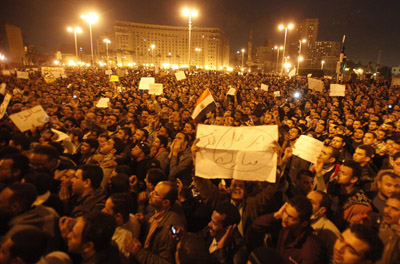Hosni Mubarak’s regime has had 29 years to perfect its always brazen but never convincing justifications for repressing journalists who expose the travesties he and his henchmen regularly visit upon the people of Egypt. It has also long enlisted state-owned media to disseminate the ruling party’s half-truths and outright lies. But over the past week, Mubarak’s propaganda machine has hit a new low.
As police, Interior Ministry thugs, and plainclothes state security agents terrorized hundreds of thousands, if not millions, of their compatriots on the streets of Egypt’s cities for days on end, various state television stations have run programming that illustrated how detached the government is from the average citizen. I glared at my screen in disbelief as various channels aired an excess of musical, variety, and cooking shows. The news bulletins underreported the extent of popular dissatisfaction on the streets with Soviet-like persistence. To be clear, state-owned media has always showered Mubarak and his policies with praise, but the last time the state peddled such outright lies was during the Six-Day War in 1967, when state radio and television told citizens for days on end that the Egyptian military was roundly defeating Israel, when in fact the exact opposite was true. Back then the state maintained a monopoly over the means of communication; this isn’t the case today.
Not only that, but the government also shut down Al-Jazeera’s bureaus, detained some of its staff and confiscated its equipment. A few bloggers are saying that one particular report about body counts at a morgue precipitated the closure. Two of the network’s news channels were taken off the state-owned Nilesat satellite. Multiple officials and pro-government commentators accused the news channel of agitation and even subversion. It ought to be clear to any honest observer that the acts that news media are documenting, perpetrated by the regime, are at the root of this popular uprising rather than the mere documentation and dissemination of the acts that have been committed. That’s what the throngs of Egyptians in
When one unconfirmed report caught my eye, I knew whom to call to get to the bottom of the story, which sounded implausible. My contact was in Tahrir Square when she took my call and after asking a few people, she said that a number of protesters were shuffling in and out of the square (an affair that depending on your location can take as long as 15 minutes because of the size of the crowd), carrying a number of curious items.
Here’s what they did: Some creative individuals managed to connect the extension cables to power sources in some of the businesses in the square. They tuned one of their impromptu street theaters to Al-Jazeera and the second to Al-Jazeera Mubasher. They had written down the frequencies necessary to receive the signals from a different satellite after both broadcasts were blocked on Nilesat. Not surprisingly, nobody tuned into any of the state-owned channels. They also brought sheets of paper and crayons so that some of the children in the crowd could color as they camped out in the square.
By the next morning, Al-Jazeera was reporting that other Arabic-language channels, in a spectacular show of solidarity, were transmitting Al-Jazeera’s broadcast on their own channels after the government went one step further by interfering with Al-Jazeera’s signal on Showtime Orbit’s cable network, which also carried Al-Jazeera. The Beirut-based journalist Habib Battah told CPJ over the telephone that he talked to employees at Orbit who confirmed that its signal “was being interfered with from Egypt,” but could not provide additional information.
Clearly, people are no longer putting up with the government’s patronizing attempt to steer a population of 85 million as if it were a herd that cannot chose for itself what news it wants to consume.
The people have spoken. Stay tuned; they seem to have more to say.
